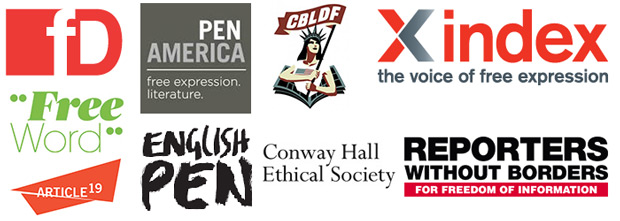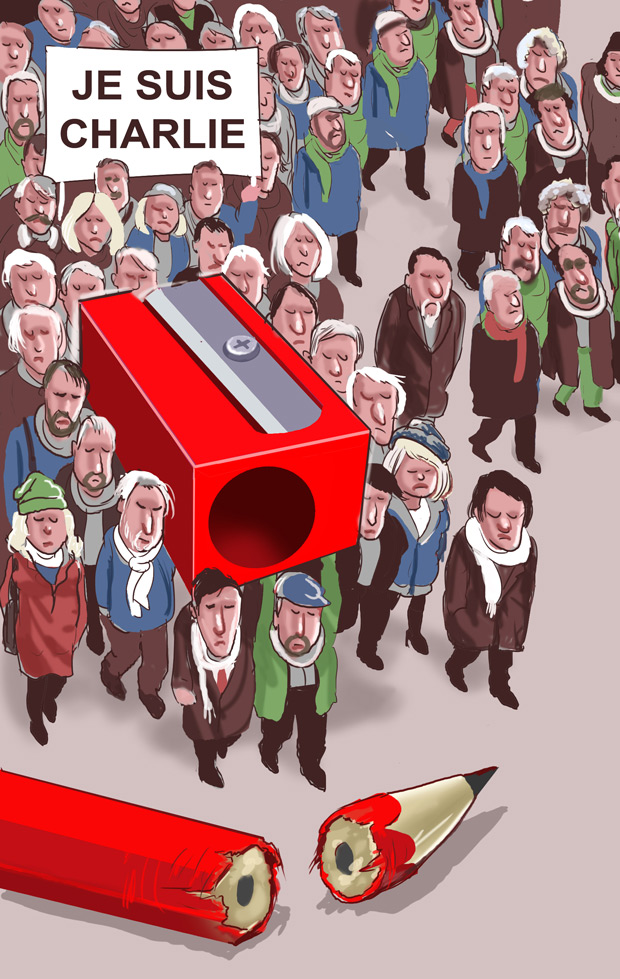13 Jan 2015 | News and features, United Kingdom
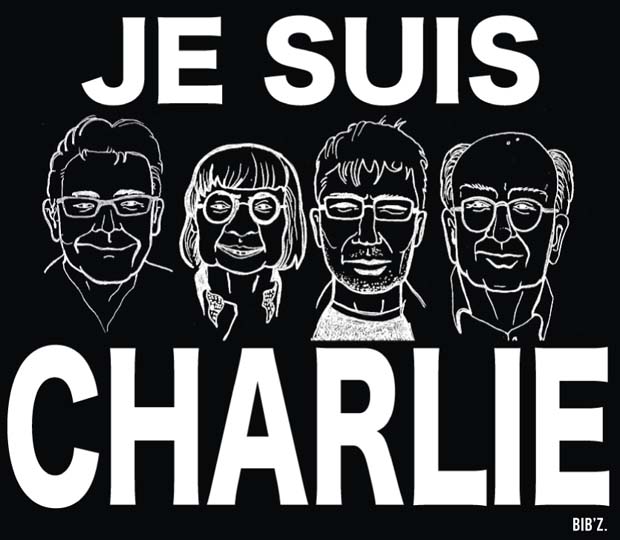
Nadhim Zahawi is a member of the BIS Select Committee, the Party’s Policy Board and MP for Stratford on Avon. This article is from Conservative Home
You can’t kill an idea by killing people. The sickening attack on Charlie Hebdo has shown that to be true. As France mourns her dead, millions around the world are discovering the work of her bravest satirists. Nous sommes Charlie.
Unfortunately, the same is true of the terrorists. Bin Laden may be at the bottom of the sea, but his poisonous ideology lives on. As long as it inspires deluded young men to kill, these attacks will keep happening. We can’t win this fight unless we also win the battle of ideas.
This is an urgent task. Thousands of EU citizens have travelled to the Middle East to serve under ISIS’s black banner. Many will return with combat experience and carrying the virus of radicalism. Some will be eager to put their new terrorist skills to work. It’s vital that we stop them.
Our security services have an important role to play, but research suggests that the most effective way of tackling terrorism is “changing the narrative”. That means challenging the stories used by extremists to justify their twisted worldview.
First and foremost, this means rejecting the idea that this this is a clash of civilizations: Islam versus the West. The reality is that jihadists have claimed more lives in the Islamic world than anywhere else. In December last year, the Pakistani Taliban gunned down 132 schoolchildren in their classrooms. On the same day as the attack in Paris, a car bomb exploded in Yemen killing at least 38 people. Muslim-majority countries, as much as the West, have a clear interest in stamping out this ideology.
It’s time the Islamic world took a leadership position on this issue. When the news from Paris broke, countries such as Saudi Arabia, Pakistan and Afghanistan were quick to condemn the attacks. Yet all three have legal systems carrying the death penalty for blasphemy. In virtually every Muslim-majority country, publishing a magazine like Charlie Hebdo would earn you a fine or imprisonment.
These laws support the idea that religious offence is a crime to be punished rather than a price we must pay for freedom of expression. They also fuel extremist violence. In Pakistan, blasphemy charges are often levied at religious minorities on the flimsiest of pretexts. Those accused are sometimes lynched by vigilante mobs while awaiting trial. Politicians who’ve dared to speak out against the laws have been assassinated.
One of the best tributes we could pay to the brave men and women of Charlie Hebdo would be to use our diplomatic influence to get some of these laws repealed. Change won’t happen overnight, and we will have to be patient with these countries. After all, the last successful prosecution for blasphemy in Britain was as recent as 1977, and the laws only came off the statute books in 2008.
I am not arguing that we should preach to Islamic governments; but nor should we turn a blind eye to this issue. Reforming attitudes to blasphemy would send a powerful message to extremists: freedom of speech isn’t just a Western value – it’s our common birthright as human beings.
And we shouldn’t be frightened of having a conversation about religion here at home. Talking about religion doesn’t come naturally. As a culture, we ‘don’t do God’. Yet it’s vital that mainstream Muslims feel comfortable discussing their faith in public. They, not the Government, are best placed to take on the dodgy imams and self-appointed sheikhs in open debate.
The Qur’an is clear that it’s the role of Allah, not man to judge unbelievers. In the 7th Century, Ali bin Abi Talib, the cousin of the Prophet and a leader of the original Islamic Caliphate, said: “Whoever does not accept others’ opinions will perish”. There’s a sound Islamic case for freedom of expression, and it needs a good airing.
Last, we have to practice what we preach. If we want Muslims to come out and say “not in my name” every time there’s a terrorist atrocity we too need to be vocal in our condemnation of attacks on Muslims and mosques in the West.
Charlie Hebdo was a target because humour is dangerous. You can’t be the all-powerful Islamic Caliphate and be the butt of someone else’s joke. The goal of terrorism is to frighten us – so laughter is one of our most powerful weapons.
This article was originally posted at Conservative Home on January 12, 2015. It is reposted here with permission.
12 Jan 2015 | News and features, Statements, Turkey Statements
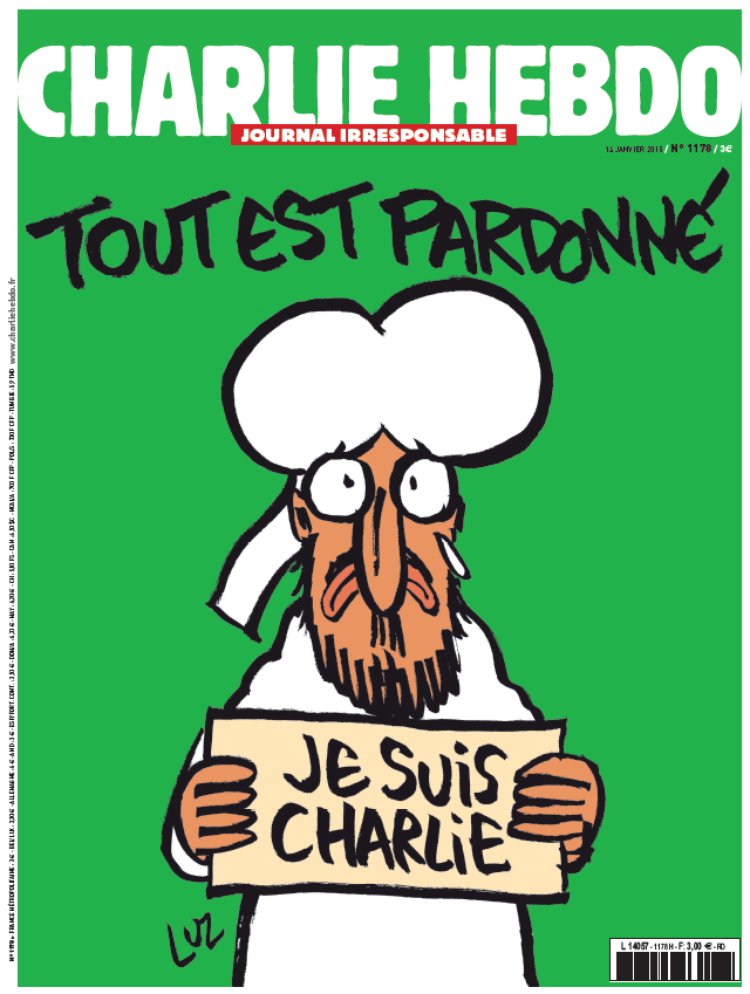
Tout est pardonne or all is forgiven, the first post attack cover of Charlie Hebdo
If you said “I believe in free expression, but…” at any point in the past week, then this is for you. If you declared yourself to be “Charlie”, but have ever called for an offensive image to be removed from public viewing, then this is for you. If you “liked” a post this week affirming the importance of free speech, but have ever signed a petition calling for a speaker to be banned, then this is for you.
Because the rush to affirm our belief in free expression in the wake of Charlie Hebdo attacks ignores a simple truth: that free speech is being eroded on all sides, and all sides are responsible. And it needs to stop.
Genuine free expression means being able to articulate thoughts, feelings and ideas without fear of harm. It is vital because without it individuals would be subject to the whim of whichever authority dictated what ideas and opinions – as opposed to actions – are acceptable. And that is always subjective. You need only look at the world leaders at Sunday’s Paris solidarity march to understand that. Attendees included Ali Bongo, President of Gabon, where the government restricts any journalism critical of the authorities; Turkish Prime Minister Ahmet Davutoglu, whose country imprisons more journalists in the world than any other; and the UK’s David Cameron, who declared his support for free expression and the right to offend, while his government considers laws that could drive debate about extremism underground.
It is precisely the freedom for others to say what you may find offensive that protects your own right to express your views: to declare, say, your belief in a God whom others deny exists; or to support a political system that others dismiss. It is what enables scientific and academic thought to progess. As soon as we put qualifications around “acceptable” free expression, we erode its value. Yet that is precisely what happened time and again in response to the Charlie Hebdo attacks, with individuals simultaneously declaring their support for free expression while seeming to suggest that the cartoonists and anyone else who deliberately courts offence should choose other ways to express themselves – suggesting that the responsibility for “better” speech always lies with the person deemed to be causing offence rather than the offended.
“The free communication of ideas and opinions is one of the most precious of the rights of man. Every citizen may, accordingly, speak, write and print with freedom…”
French National Assembly, Declaration of the Rights of Man, August 26, 1789
Index believes that the best way to tackle speech with which you disagree, including the offensive, and the hateful, is through more speech, not less. It is not through laws and petitions that restrict the rights of others to speak. Yet, increasingly, we use our own free speech to call for that of others to be limited: for a misogynist UK comedian to be banned from our screens, or for a UK TV personality to be prosecuted by police for tweeting offensive jokes about ebola, or for a former secretary of state to be prevented from giving an address.
A project mapping media freedom in Europe, launched by Index just over six months ago, shows how journalists are increasingly targeted in this region, including – prior to last week’s incidents – 61 violent attacks against the media. Globally, the space for free expression is shrinking. We need to reverse this trend.
If you genuinely believe in the value of free speech – that all ideas and opinions must be heard – then that necessarily extends to the offensive and the vile. You don’t have to agree with someone, or condone what they are saying, or the manner in which it is said, but you do need to allow them to say it. The American Civil Liberties Union got this right in 1978 when they defended the rights of a pro-Nazi group to march in Chicago, arguing that rights to free expression needed apply to all if they were to apply to any. (As did charity EXIT-Germany late last year, when it raised money for an anti-fascism cause by donating money for every metre walked during a neo-Nazi march).
Countering offensive speech is – of course – only possible if you have the means to do so. Many have observed, rightly, that marginalisation and exclusion from mainstream media denies many people the voice that we would so vociferously defend for a free press. That is a valid argument. But this should be addressed – and must be addressed – by tackling this lack of access, not by shutting down the speech of those deemed to wield power and privilege.
Voltaire has been quoted endlessly in support of free expression, and the right to agree to disagree, but British author Neil Gaiman, who discusses satire and offence in the latest Index magazine, also had it right. “If you accept — and I do — that freedom of speech is important,” he once wrote, “then you are going to have to defend the indefensible. That means you are going to be defending the right of people to read, or to write, or to say, what you don’t say or like or want said…. Because if you don’t stand up for the stuff you don’t like, when they come for the stuff you do like, you’ve already lost.”
In the coming weeks, Index will redouble its efforts to build greater understanding of the benefits of free speech, to promote a better informed and wider public debate on censorship, and on offence. We will run a series of articles, public debates and workshops to encourage people to consider what it really means to support free expression, with the aim of reversing a tide of censorship-by-offence, and encouraging more speech, not less.
What can you do? Join the debate. #Keeptalking
This article was posted on 12 January 2015 at indexoncensorship.org
8 Jan 2015 | Europe and Central Asia, France, News and features, Statements
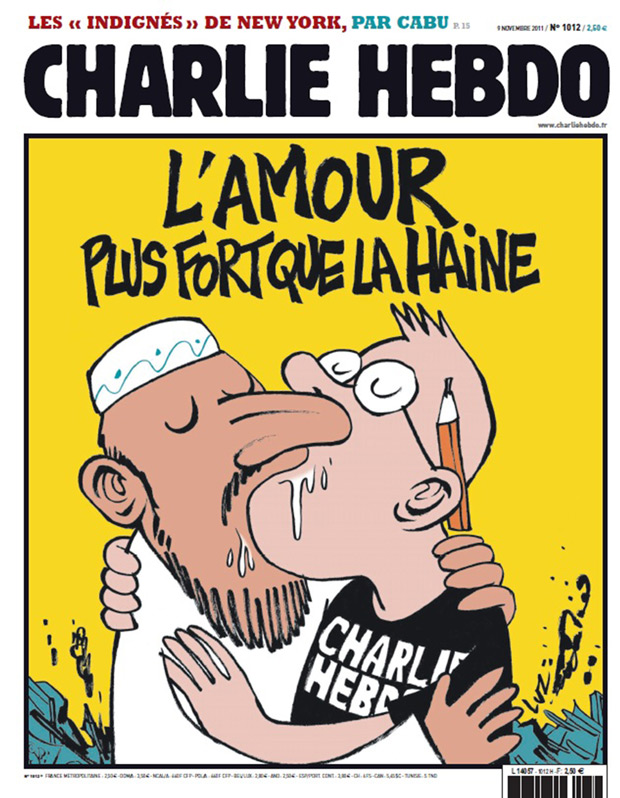
Today we are publishing work from the satirical magazine Charlie Hebdo as part of a global action in a signal of solidarity with the French publication, which came under such deadly attack yesterday.
The joint action also underlines the commitment of authors and journalists around the world to state their commitment to freedom of expression and its vital importance. We stand together for the right to mock, to caricature, to argue, debate and offend.
We believe that only through solidarity – in showing that we truly defend all those who exercise their right to speak freely – can we defeat those who would use violence to silence free speech.
We have selected 12 cartoons from Charlie Hebdo that reflect the broad sweep of its satire, which ranges from politics, to immigration, to religion*. As part of the joint action, publications are selecting a cartoon, a range of cartoons, or covers that they believe best reflect the work of Charlie Hebdo. The idea is a moment of unity in which we show that together we stand up for journalism and the right to free speech, no matter what, and to show our support and respect for those killed on January 7.
Many organisations and individuals have already posted a number of the Charlie Hebdo cartoons, including Berliner Zeitung, Buzzfeed, The Daily Beast, Fox News, and The Times of London. Some reflect the wide variety of satirical content of Charlie Hebdo, others focus only on those related to Islam. Our own aim is to show that fear should not be allowed to stifle free expression, and to reflect the full range of Charlie Hebdo’s work.
“The ability to express ourselves freely is fundamental to a free society,” said Jodie Ginsberg, CEO of Index on Censorship. “This includes the freedom to publish, to satirise, to joke, to criticise, even when that might cause offence to others. Those who wish to silence free speech must never be allowed to prevail.”
You can see the joint statement on the action here.
Over the past decade it has often been left to small individual publications to take a strong stand on freedom of expression incursions. This global action is a way of showing it is not just one publication or author that stands alone.
For those over the years who say they support freedom of expression but with opt outs, or who have argued that freedom of expression doesn’t extend to articles, photographs or cartoons which offend them, it should be made clear that freedom of expression gives everyone the chance to debate opinions, and that right is vital.
If we stopped writing or broadcasting about every issue that someone found offensive then the newspapers and television news would be empty of subjects. We would know nothing, and we would have no way of knowing what others thought. As John Stuart Mill wrote in On Liberty: “If all mankind minus one, were of one opinion, and only one person were of the contrary opinion, mankind would be no more justified in silencing that one person, than he, if he had the power, would be justified in silencing mankind.” Let our response to the attack on Charlie Hebdo not be silence.
*It is worth noting that in 2014, of 52 front covers, 39 had a focus on politics (31 on French politics, six on international politics and two on gender politics; of these four had a sub-focus on religion – e.g. focus on Marine le Pen and mention antisemitism); eight had a focus on religion (specifically, nos: 1130, 1142, 1143, 1147, 1162, 1163, 1166, 1173) and five had a focus on current events (e.g. flight MH370, Ebola)
Some of the publications and organisations joining us at this hour include:
The Guardian
New Statesman
Mail and Guardian
Folha de San Paulo
City Press
Comic Book Legal Defense Fund
Pen America
Article 19
English Pen
Reporters Without Borders
Conway Hall
Atheist NI
The Art Newspaper
New Humanist
Stephen Fry
Los Angeles Times
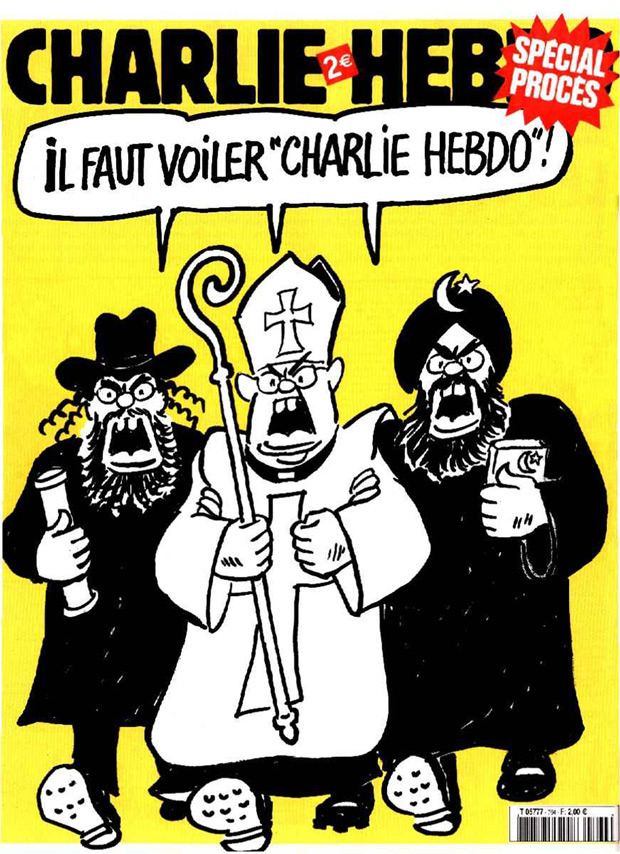
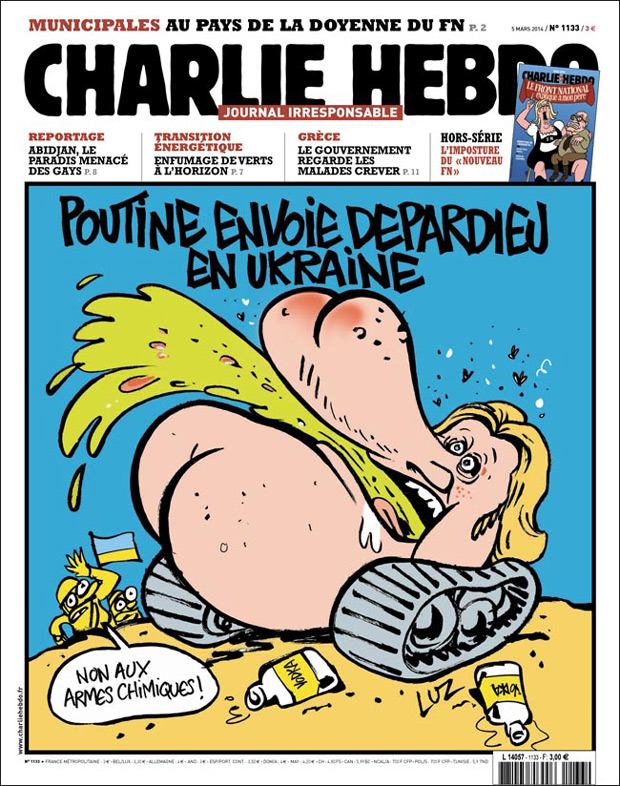
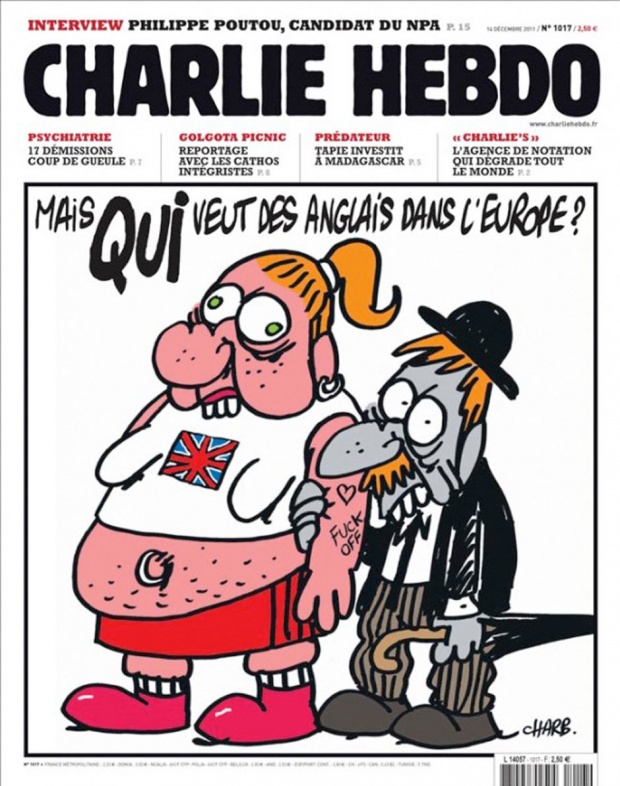
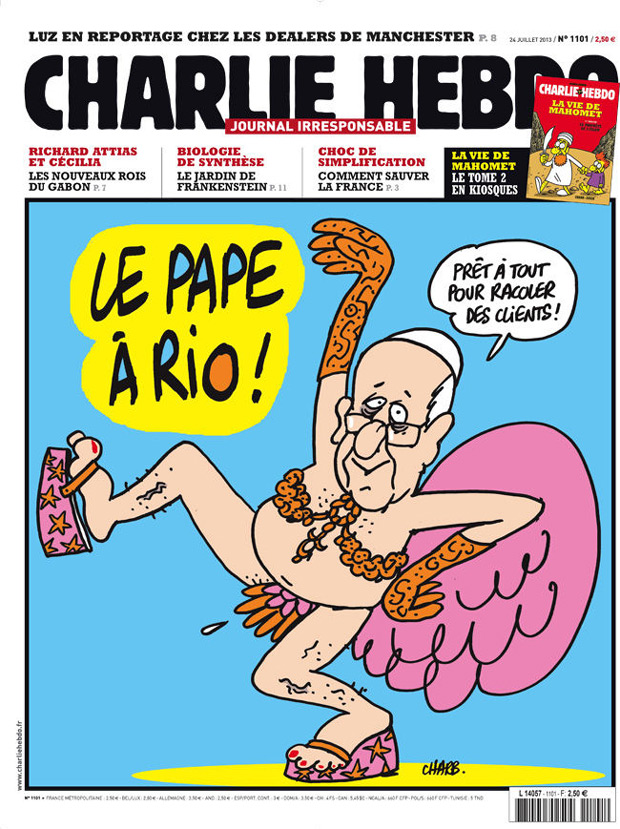
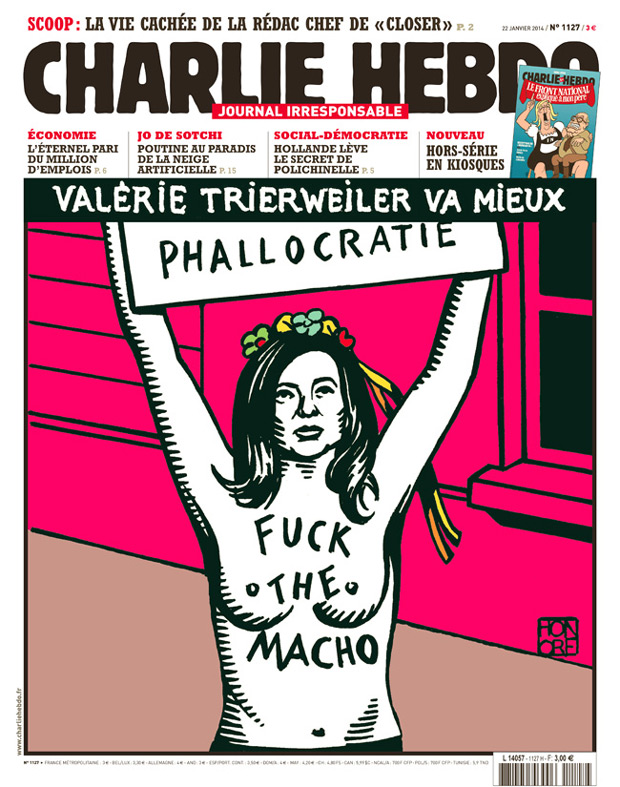

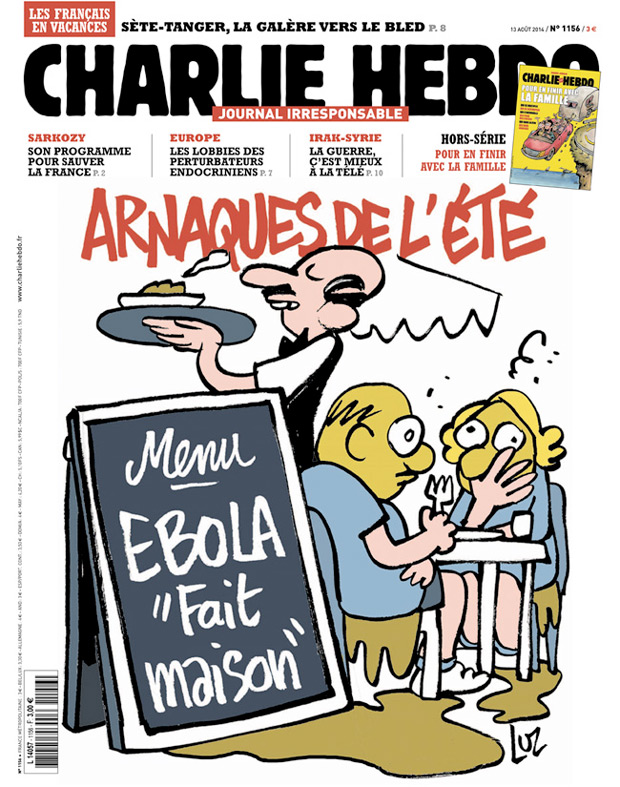
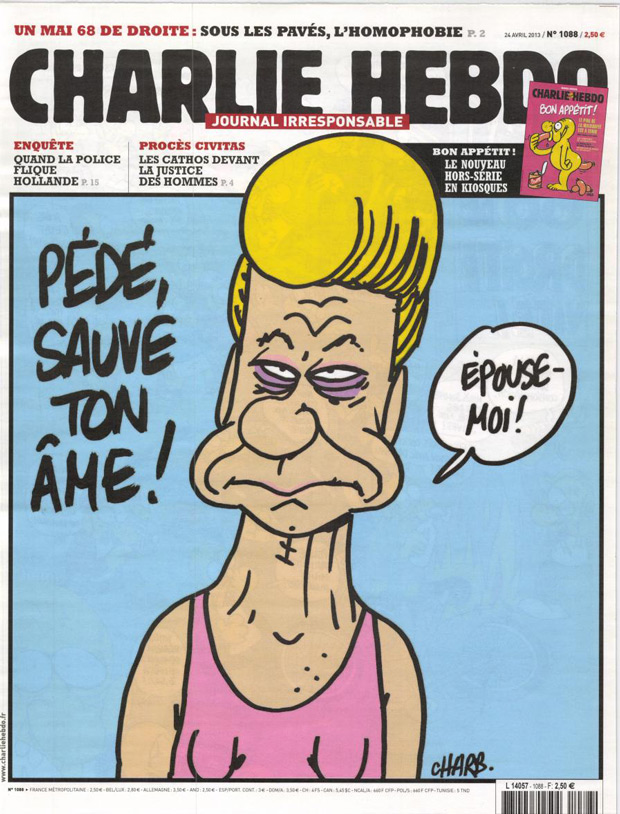
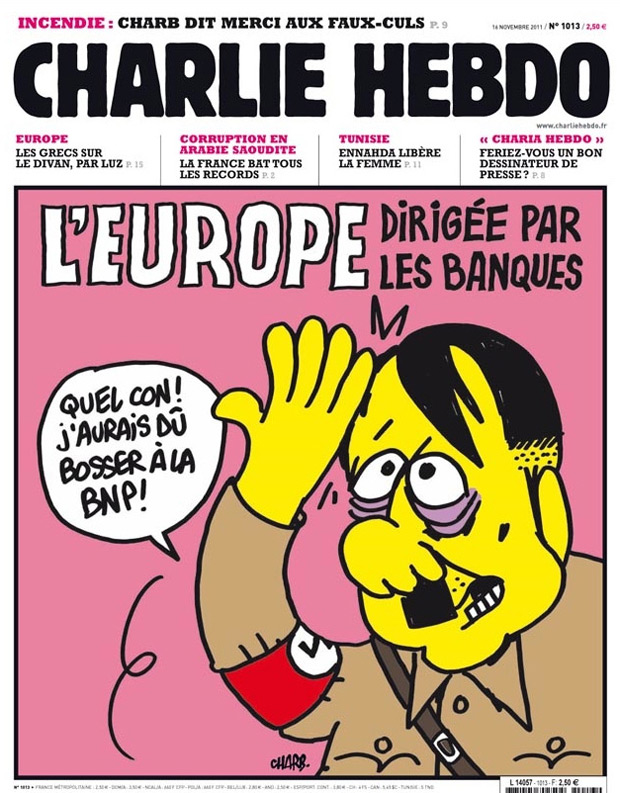
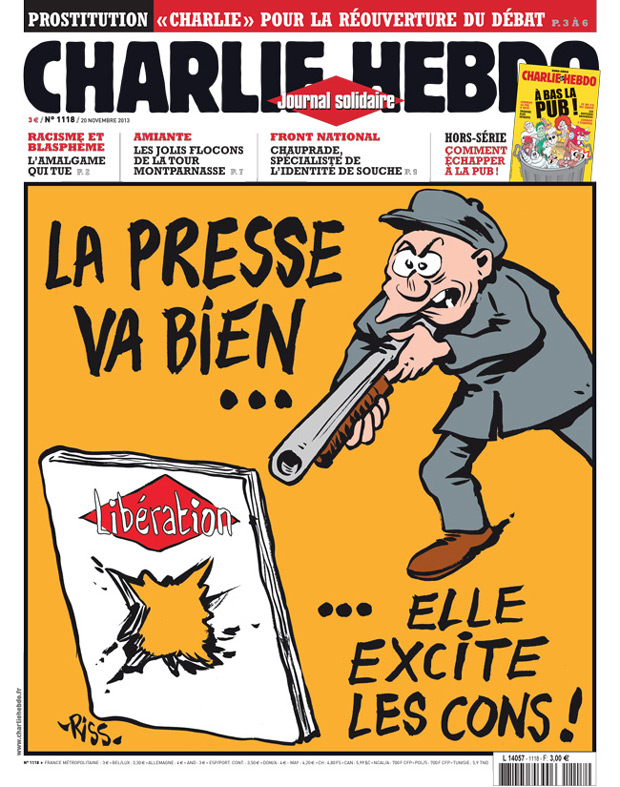
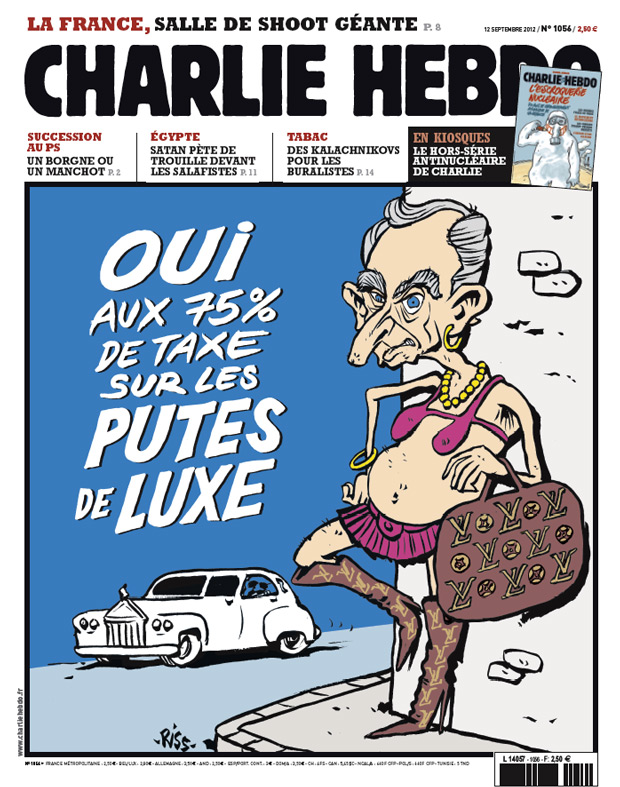
8 Jan 2015 | About Index, Campaigns, Europe and Central Asia, France, Statements
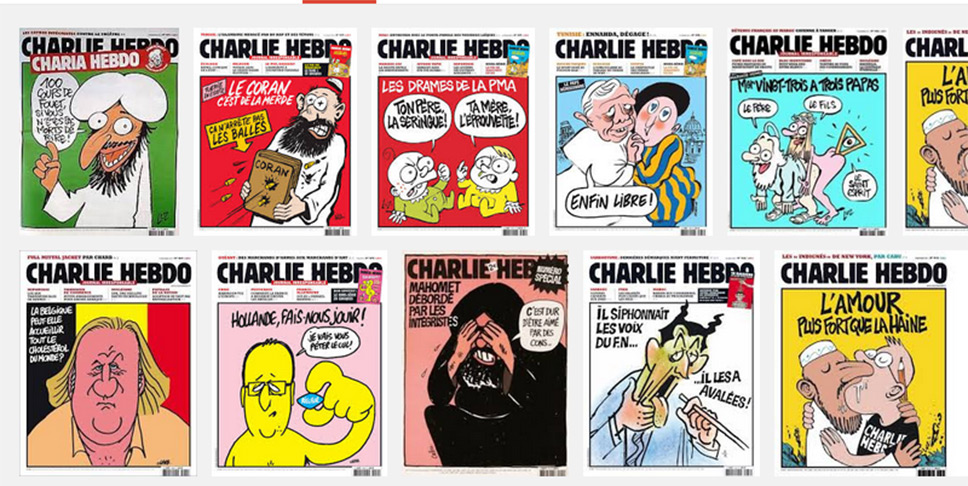
Index on Censorship, the Comic Book Legal Defense Fund, freeDimensional, PEN America, FreeWord, Reporters Without Borders, Article 19 and English PEN call on all those who believe in the fundamental right to freedom of expression to join in publishing the cartoons or covers of Charlie Hebdo on January 8 at 1400 GMT.
We believe that only through solidarity – in showing that we truly defend all those who exercise their right to speak freely – can we defeat those who would use violence to silence free speech. We ask media organisations, individuals and everyone who supports free speech to join together in this action.
Each publication will select a cartoon, a range of cartoons, or covers that they believe best reflect the right to free expression and publish at the same time globally. The idea is a moment of unity in which we show that together we stand up for journalism and the right to free speech, no matter what, and to show our support and respect for those killed on January 7.
“The ability to express ourselves freely is fundamental to a free society,” said Jodie Ginsberg, CEO of Index on Censorship. “This includes the freedom to publish, to satirise, to joke, to criticise, even when that might cause offence to others. Those who wish to silence free speech must never be allowed to prevail.”
“Satire is both a privilege and a necessity in a free society. The freedom to question, to expose, to mock ultimately makes institutions, belief systems, and leaders stronger. The resort to murderous vengeance for the crime of drawing and publishing cartoons represents a terrifying perversion of religious values and an assault on our shared values. No matter how offensive, speech is never a justification for violence,” said Suzanne Nossel, Executive Director, PEN American Center.
“The attack on the Charlie Hebdo offices is tragic, but it is also proof of just how powerful cartoons and cartoonists can be. Despite threats and prior attacks, the publishers, editors, and cartoonists of Charlie Hedbo never relented in using satire to question the world around them,” said Comic Book Legal Defense Fund Executive Director Charles Brownstein. “CBLDF stands with Charlie Hebdo and their dedication to free expression.”
“This unspeakable act of violence has challenged and assailed the entire press,” said Lucie Morillon, Programme Director, Reporters Without Borders. “Journalism as whole is in mourning. In the name of all those who have fallen in the defence of these fundamental values, we must continue Charlie Hebdo’s fight for the right to freedom of information,” Lucie Morillon, Head of Reporters Without Borders Advocacy Department, said.
“This is a time for all writers, publishers, editors, artists and free speech groups to stand in solidarity. In the face in one of the most devastating attacks on press freedom and freedom of expression in Europe’s recent history, we need to reaffirm our commitment to speaking out and standing up for free speech. This action today is the first step,” Jo Glanville, Director of English PEN, said.
For more information, please contact:
Index on Censorship
0207 260 2660
